Film Name: 東極島 / Dongji Island / Dongji Rescue
Before diving into the main text, I’d like to recommend the documentary “The Sinking of the Lisbon Maru” once again. It was one of my favorite films last year and also served as the inspiration for the newly released film “Dongji Island.”
The story is simple: On October 1, 1942, an American submarine struck the Japanese cargo ship Lisbon Maru, unaware that it was carrying over 1,800 British prisoners of war. Amid the tragic deaths of many British soldiers, fishermen from nearby Dongji Island risked their lives to rescue hundreds of survivors, ultimately bringing this story to the world’s attention.
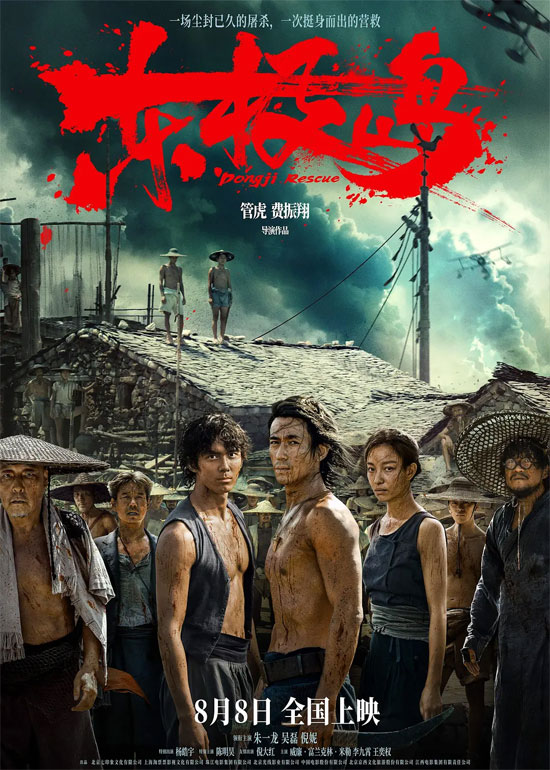
To be honest, as a commercial film, I don’t think the adaptation of “Dongji Island” is particularly outstanding. This is mainly because the historical events themselves are already highly dramatic, and “The Sinking of the Lisbon Maru” is a rare documentary with a strong narrative. As a result, the original characters and storylines added for commercial storytelling purposes feel somewhat lackluster.
That said, the film does one thing well: it emphasizes the anti-Japanese theme that was not as prominent in the original story, clearly explaining the necessity of resisting invaders and how everyone can contribute to the resistance in their own way. At least it wasn’t all for nothing.
[Friendly reminder: The following text contains spoilers.]
I am not very satisfied with the first half of Dongji Island. The story is exciting largely because of the different perspectives of the various forces and characters, but the film almost completely omits the Japanese, American, and even British prisoners of war, instead focusing on the characters on Dongji Island, which results in a large part of the story being relegated to the background.
Originality is fine, as long as it is entertaining and reasonable, but unfortunately, most of the characters seem awkward.
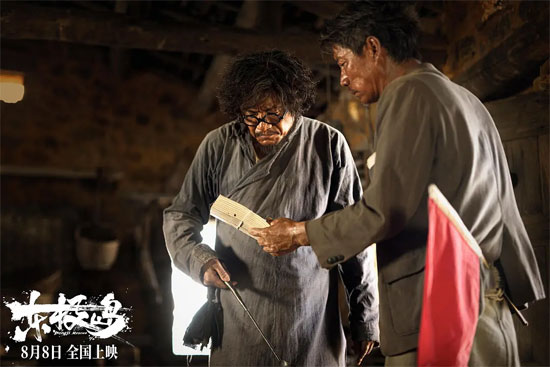
The two characters that most give me pause are Mr. Chen, the teacher, and Li Yuanxing. One is a deserter, the other a village chief—both outsiders who came to Dongji Island to make a living. They serve as bridges between the island’s fishermen and the outside world, yet they are also the figures most capable of uniting the main creative vision.
Unfortunately, both characters are only partially developed, or rather, the “black humor” in their personas overshadows their tragedy and complexity.
Mr. Chen constantly talks about resistance, making the children memorize “Full River Red,” yet in action, he is always a coward. When he finally gathers the courage to fight the Japanese, his gun jams due to prolonged disuse, leading to a chaotic battle where he ultimately sacrifices himself.
Li Yuanxing, on the other hand, constantly urges everyone to endure and not provoke the Japanese, insisting that survival is the priority. Yet this man who knows how to endure humiliation and survive becomes the most reckless when pushed to the limit. It’s not that it’s unrealistic, but the stark contrast between his earlier restraint and later recklessness exposes the limitations of the storytelling.
Meanwhile, “Dongji Island” lacks memorable villains, with the Japanese soldiers portrayed in stereotypical, one-dimensional ways.
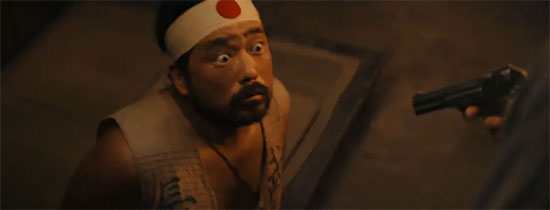
The only Japanese soldier who left an impression on me was the chubby, dim-witted one stationed long-term on Dongji Island, who often acted so foolishly he didn’t seem like a Japanese soldier at all.
Unlike the naval forces fighting the Allied forces in Southeast Asia, the Japanese troops stationed in China had long lost the vigor they had when they first invaded on a large scale. Both their manpower and governance were in decline, mired in the quagmire of a security war, and they were subjected to daily brainwashing about the “invincibility of the Imperial Army.” Numbness and apathy had become the norm for many lower-ranking Japanese soldiers.
So when I saw this Japanese soldier, I found him quite interesting. He was always smiling and taking bribes, but when the newly arrived Japanese soldiers started killing people indiscriminately, he was also scared (oh, and he was also mocked for being from Kansai). When Mr. Chen raised his gun, he was so scared he didn’t know what to do. When Ah Bi came to seek revenge, he was completely helpless, like a lamb waiting to be slaughtered…
This is not to say that he was weak and ridiculous, so he wasn’t a Japanese soldier. On the contrary, his words and actions, as well as his fate, clearly demonstrated the inevitable defeat of Japanese militarism.
PS: I personally dislike bashing, but I must say that in terms of storytelling and character development, the recently released “Dead To Rights” is significantly stronger than “Dongji Island.”
Let’s discuss the performances of the main characters in “Dongji Island.” Personally, I feel there are both good and bad aspects.
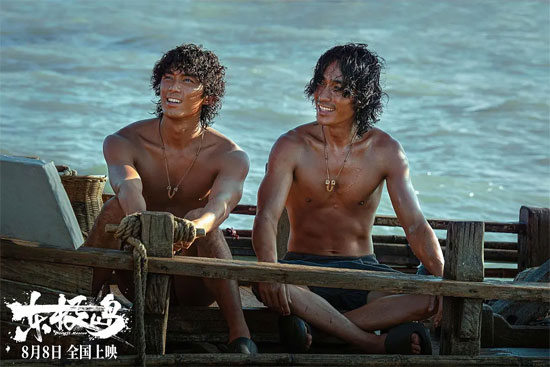
The main characters of the film are two brothers, A-Bi (played by Zhu Yilong) and A-Dang (played by Wu Lei), along with the female lead A-Hua (played by Ni Ni). They are all adopted children of Wu Lao Da—in other words, none of them are “true-blooded” Dongji Islanders.
This relative difference in their backgrounds is a double-edged sword. On the one hand, it helps justify their daring to defy tradition and make changes. On the other hand, it dilutes the rebellious sentiments that also exist among the fishermen.
However, from the narrow perspective of “why we must resist,” the design of these brothers is still acceptable, though somewhat clichéd, it is easy to understand and effective:
The younger brother, A-Dang, grew up defying his older brother A-Bi’s orders to “mind his own business.” He rescued the drowning British prisoner Newman, indirectly leading to the village’s suffering. As he witnessed more and more Japanese atrocities, he finally couldn’t bear it anymore and chose to die alongside the Japanese soldiers. Losing his brother, Ah Bi was driven by pain and hatred to begin killing Japanese soldiers and rescuing prisoners, completing the journey of a ordinary person from self-interest to suffering a major transformation and finally awakening to rebellion.
“Dongji Island” employs a visually symbolic technique effectively in this process: the fishermen’s conical hats.
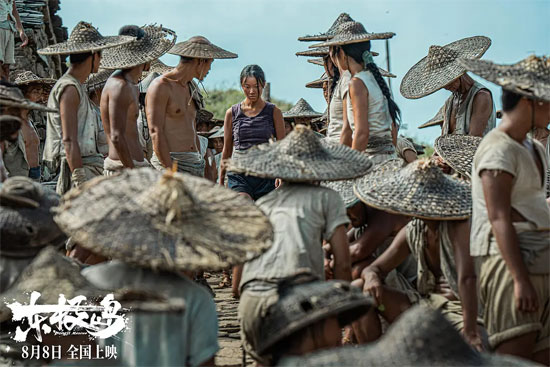
Except for a few main characters, the rest of the Dongji Island fishermen initially kept their heads down and wore conical hats, so their faces were never seen… And since their faces were not visible, the audience could not easily project their emotions onto them—at this point, they represented the many numb, indifferent, and powerless ordinary Chinese people who dared not speak out.
As the plot unfolds, the fishermen are constantly pushed to their limits. When they realize there is no room to retreat or endure any longer, they gradually lift their heads. When preparing to set sail collectively to rescue others, they all remove their conical hats, revealing their true faces.
By the way, the design and portrayal of Ah Hua’s character are problematic. She is neither a mere prop nor a fully developed independent woman. Especially when emphasizing “women going out to sea,” the awkwardness is unavoidable, as the story of “Dongji Island” has little room for gender narrative. Suddenly introducing this element feels like a forced addition for the sake of political correctness…
Once Ah Bi, Ah Hua, and the fishermen set sail one after another, the story becomes straightforward. Boarding the ship, breaking the cage, and diving into the sea to rescue people are the most thrilling parts of the film.
The large-scale underwater and on-water practical shots are indeed substantial and worth watching on the big screen, which is the kind of visual and auditory feast that “Dongji Island” as a commercial blockbuster should deliver.
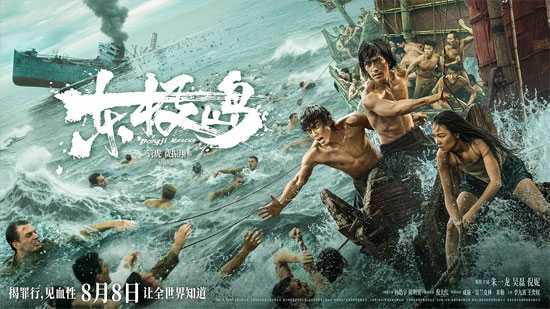
Overall, Dongji Island is not a particularly outstanding film, but it is still worth watching.
Finally, I would like to recommend The Sinking of the Lisbon Maru once again. It is a documentary with an excellent storyline and humanistic qualities, and it better reflects the internationalism and humanitarianism of this story.
Please specify:Anime Phone Cases » Dongji Island 東極島 2025 Film Review: The adaptation is average, but still worth watching.